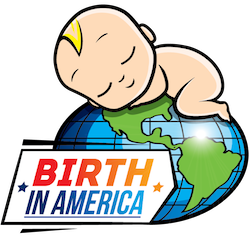Write your contacts
By clicking on the button, you consent to the processing of personal data and agree to the Privacy Policy.
Right of the soil and countries that give citizenship by birth

A matter of citizenship by birth is hotly debated everywhere – from the U.S. to Japan – with moms-to-be being the most concerned participants of all discussions on the issue. However, most of those discussions are couched in scores of Latin-derived terms and parlance that may be too confusing to understand. Let's delve into the details on the matter to make it clearer.
There are three terms that you've probably heard more often than others: jus soli, jus sanguinis, and lex soli. The former is essentially a Latin word for the right of the soil, which is nothing short of the right to acquire citizenship by birth. This principle dates back to the 17th century when it was introduced in England. It means that a child born within the territory of a country automatically obtains citizenship of this country, regardless of the nationality of his or her parents.
Unlike the right of the soil, jus sanguinis is based on ethnic grounds rather than the territory. According to this concept, children do not acquire citizenship by place of birth. It doesn't matter where a child is born because his or her nationality is determined by the right of blood.
Nowadays, it is jus sanguinis that is recognized in the vast majority of countries. So, if you consider giving birth abroad to provide your little one with a head start in life, stay clear of the countries that use this principle.
Another Latin word that makes people perplexed is lex soli. Fortunately, its meaning is not as puzzling as it may seem. Generally, it's a law adopted in countries with birthright citizenship that governs the process of acquiring nationality by place of birth. Lex soli can be specific or respective, and it aims to point out a range of restrictions to the right of the soil if any.
There are three terms that you've probably heard more often than others: jus soli, jus sanguinis, and lex soli. The former is essentially a Latin word for the right of the soil, which is nothing short of the right to acquire citizenship by birth. This principle dates back to the 17th century when it was introduced in England. It means that a child born within the territory of a country automatically obtains citizenship of this country, regardless of the nationality of his or her parents.
Unlike the right of the soil, jus sanguinis is based on ethnic grounds rather than the territory. According to this concept, children do not acquire citizenship by place of birth. It doesn't matter where a child is born because his or her nationality is determined by the right of blood.
Nowadays, it is jus sanguinis that is recognized in the vast majority of countries. So, if you consider giving birth abroad to provide your little one with a head start in life, stay clear of the countries that use this principle.
Another Latin word that makes people perplexed is lex soli. Fortunately, its meaning is not as puzzling as it may seem. Generally, it's a law adopted in countries with birthright citizenship that governs the process of acquiring nationality by place of birth. Lex soli can be specific or respective, and it aims to point out a range of restrictions to the right of the soil if any.
Citizenship by birth: Countries you need to bookmark

It should come as no surprise that the right of the soil is far from being a common practice in the world. The chances are that the only state that uses jus soli you've heard of is the U.S. Indeed, America is one of the very few countries that have birthright citizenship, and it imposes no significant restrictions to it. But what you may not know is that the U.S. is arguably the costliest state to give birth in. On average, care during/after pregnancy and delivery will cost you as much as $30,000 (leaving potential complications out of account).
Given those sky-high prices and Donald Trump's plans to abolish the right of the soil in America, it's worth considering other countries with automatic citizenship by birth. Here's a complete list of those nations by continent:
Given those sky-high prices and Donald Trump's plans to abolish the right of the soil in America, it's worth considering other countries with automatic citizenship by birth. Here's a complete list of those nations by continent:
- South America: Argentina, Bolivia, Chile, Brazil, Uruguay, Ecuador, Venezuela, Guyana, Paraguay, and Peru.
- North America: Canada, Costa Rica, Mexico, Antigua and Barbuda, Barbados, Trinidad and Tobago, Belize, The Dominican Republic, Honduras, Saint Vincent and the Grenadines, El Salvador, Grenada, Saint Kitts and Nevis, Panama, Guatemala, Jamaica, Nicaragua, and Saint Lucia.
- Oceania: Fiji and Tuvalu.
- Africa: Lesotho and Tanzania.
- Asia: Pakistan.


